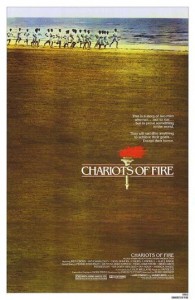 Based on a true story, Hugh Hudson’s inspirational sports movie tells the story of Eric Liddell (Ian Charleson), a serious Scottish Christian, who runs for the glory of Jesus, and Harold Abrahams (Ben Cross), a British Jew who’s a victim of prejudice whose primary motivation is to be accepted into the mainstream.
Based on a true story, Hugh Hudson’s inspirational sports movie tells the story of Eric Liddell (Ian Charleson), a serious Scottish Christian, who runs for the glory of Jesus, and Harold Abrahams (Ben Cross), a British Jew who’s a victim of prejudice whose primary motivation is to be accepted into the mainstream. Writer Colin Welland, who won the Oscar for his Original Screenplay, employs crosscutting to suggest the intersections between the lives of the two outsiders, when they meet and compete at the 1924 Olympics in Paris.
The most impressive thing about the movie is the lyrically photographed scenes of the runners striding through the surf in slow motion to the accompaniment of Vangelis’s stirring score.
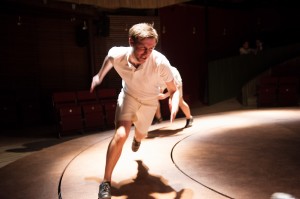 True to his beliefs to the bitter end, the real-life Liddell became a Christian Missionary, before going to China, where he eventually died in a Japanese prisoner of war camp. For his part, Abrahams went on to become the spokesperson for English amateur athletics. He was knighted and died in 1978 as a respected statesman.
True to his beliefs to the bitter end, the real-life Liddell became a Christian Missionary, before going to China, where he eventually died in a Japanese prisoner of war camp. For his part, Abrahams went on to become the spokesperson for English amateur athletics. He was knighted and died in 1978 as a respected statesman.
A bit calculated and manipulative, the Oscar-winning film was dismissed by some film critics as a piece of technological lyricism. Harsh reviewers claimed that the effects used by Hudson to make the viewers’ spirits soar are the very same effects that send us to the supermarket to shop.
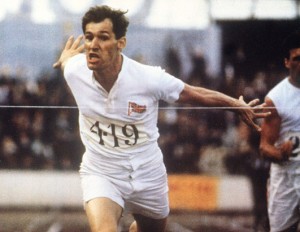 Even so, the film is well-acted, particularly by its impressive supporting cast: Nigel havens, as Lord Andrew Lindsay; the always reliable Ian Holm as Sam Musabini; John Gielgud as the Master of Trinity, Lindsay Anderson (better known as a director) as the Master of Caius, and Nigel Davenport as Lord Birkenhead.
Even so, the film is well-acted, particularly by its impressive supporting cast: Nigel havens, as Lord Andrew Lindsay; the always reliable Ian Holm as Sam Musabini; John Gielgud as the Master of Trinity, Lindsay Anderson (better known as a director) as the Master of Caius, and Nigel Davenport as Lord Birkenhead.
There are only two female parts in the basically male-dominated movie: Charyl Campbell as Jennie Liddell and Alice Krige as Sybil Gordon.
Detailed Plot
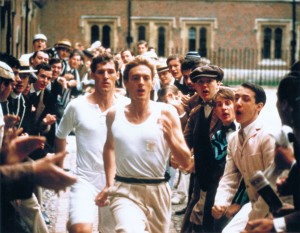 In 1919, Harold Abrahams (Ben Cross) enters Cambridge, where he experiences anti-Semitism from the staff, while enjoying his membership in the Gilbert and Sullivan club. He becomes the first person to complete the Trinity Great Court Run, practicing around the college courtyard. Abrahams achieves success in national running competitions, but has time to court Sybil (Alice Krige), a lead Gilbert and Sullivan soprano.,
In 1919, Harold Abrahams (Ben Cross) enters Cambridge, where he experiences anti-Semitism from the staff, while enjoying his membership in the Gilbert and Sullivan club. He becomes the first person to complete the Trinity Great Court Run, practicing around the college courtyard. Abrahams achieves success in national running competitions, but has time to court Sybil (Alice Krige), a lead Gilbert and Sullivan soprano.,
Cut to another, parallel story in Scotland: Eric Liddell (Ian Charleson), born in China of Scottish missionary parents. His devout sister Jennie (Cheryl Campbell) disapproves of his plan to pursue competitive sports, but Liddell sees running as a way of glorifying God before returning to China as a missionary.
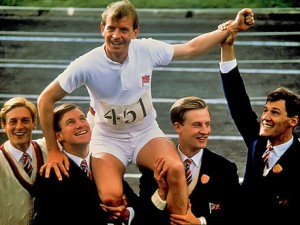 When they first race against each other, Liddell beats Abrahams. Abrahams takes it poorly, but Sam Mussabini (Ian Holm), a professional trainer, offers to help him improve his skills. The Cambridge College masters (John Gielgud and Lindsay Anderson) are critical, claiming that it’s not gentlemanly for an amateur to “play the tradesman” by using professional coach. Abrahams thinks their attitude is a cover for anti-Semitism and social class superiority.
When they first race against each other, Liddell beats Abrahams. Abrahams takes it poorly, but Sam Mussabini (Ian Holm), a professional trainer, offers to help him improve his skills. The Cambridge College masters (John Gielgud and Lindsay Anderson) are critical, claiming that it’s not gentlemanly for an amateur to “play the tradesman” by using professional coach. Abrahams thinks their attitude is a cover for anti-Semitism and social class superiority.
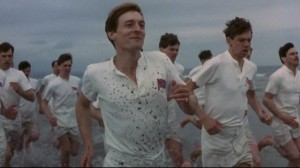 When Liddell misses a church meeting because of his running, his sister Jennie charges he no longer cares about God. For his part, Liddell insists that he feels divinely inspired when running, and that not to run would be to dishonor God: “I believe that God made me for a purpose. But He also made me fast, and when I run, I feel His pleasure.”
When Liddell misses a church meeting because of his running, his sister Jennie charges he no longer cares about God. For his part, Liddell insists that he feels divinely inspired when running, and that not to run would be to dishonor God: “I believe that God made me for a purpose. But He also made me fast, and when I run, I feel His pleasure.”
 The two athletes, after years of racing, are chosen to represent Britain in the 1924 Olympics in Paris. Also accepted are Abrahams’ Cambridge friends, Lord Andrew Lindsay (Nigel Havers), Aubrey Montague (Nicholas Farrell), and Henry Stallard (Daniel Gerroll). When Liddell learns that his 100 meter race will be on a Sunday, he refuses to run, despite pressure from the Prince of Wales and the British Olympic committee.
The two athletes, after years of racing, are chosen to represent Britain in the 1924 Olympics in Paris. Also accepted are Abrahams’ Cambridge friends, Lord Andrew Lindsay (Nigel Havers), Aubrey Montague (Nicholas Farrell), and Henry Stallard (Daniel Gerroll). When Liddell learns that his 100 meter race will be on a Sunday, he refuses to run, despite pressure from the Prince of Wales and the British Olympic committee.
Liddell’s teammate Lindsay, having already won a silver medal in the 400 meter hurdles, offers to yield his place in his race on Thursday to Liddell. Liddel’s religious convictions make headlines around the world. Liddell delivers a sermon at the Paris Church of Scotland that Sunday, and quotes from Isaiah 40, ending with: But they that wait upon the Lord shall renew their strength; they shall mount up with wings as eagles; they shall run, and not be weary; and they shall walk, and not faint.
Meanwhile, Abrahams, beaten by the U.S. runners in the 200 meter race, realizes that his last chance for a medal will be the 100 meters. He competes in the race and wins god medal, delighting his coach Sam Mussabini, and allowing him to reunite with Sybil.
The American coach feels that Liddell has little chance of doing well in his now far longer 400 meter race, but one of the American runners, Jackson Scholz, hands Liddell a note of support for his convictions. Liddell defeats the American and wins the gold medal.
In postscript, we learn that Abrahams married Sybil and became the elder statesman of British athletics, and Liddell did missionary work in China, where he died in 1945 during the Japanese occupation.
Oscar Nominations: 7
Picture, produced by David Puttnam
Director: Hugh Hudson
Screenplay (Original): Colin Welland
Supporting Actor: Ian Holm
Film Editing: Terry Rawlings
Costume design: Milena Canonero
Original Score: Vangelis
Oscar Awards: 4
Picture
Screenplay
Costume Design
Original Score
Oscar Context
In 1981, the British sports melodrama,”Chariots of Fire,” was the surprise winner of the Best Picture Oscar, with 7 nominations and four awards. The other four nominees were (alphabetically): Louis Malle’s “Atlantic City,” The schmaltzy family saga “On Golden Pod,” Warren Beatty’s semi-successful epic “Reds,” which received the largest number of nominations (12), and Spielberg’s nostalgic but well executed adventure “Raiders of the Lost Ark.”
Cast
Harold Abrahams (Ben Cross)
Eric Liddell (Ian Charleston)
Lord Andrew lindsay (Nigel Havers
Aubrey Montague (Nicholas Farrell)
Sam Mussabini (Ian Holm)
Master of Trinity (John Gielgud)
Master of Caius (Lindsay Anderson)
Lord Brikenhead (Nigel Davenport)
Jenny LIddel (Cheryl Campbell)
Sybil Gordon (Alice Krige)
Credits
Warner (Enigma Poductions/The Ladd Company)
Running time: 123 Minutes










